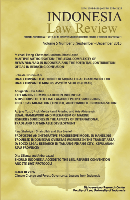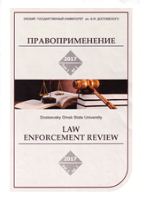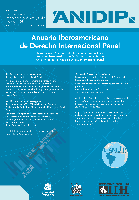
Laws
Scope & Guideline
Fostering dialogue on pressing legal issues.
Introduction
Aims and Scopes
- Human Rights Law:
The journal frequently explores themes related to human rights, focusing on their implications in various contexts, such as the rights of minorities, children, and issues arising from international law. - Legal Frameworks and Policy Analysis:
A significant aspect of the journal's contributions involves analyzing existing legal frameworks and policy implications, particularly in areas such as environmental law, immigration, and public health. - Interdisciplinary Approaches:
The journal encourages interdisciplinary research that connects law with other fields such as sociology, psychology, and technology, thereby fostering a holistic understanding of legal phenomena. - Emerging Legal Technologies:
There is a growing focus on the intersection of law and technology, examining the legal implications of digital innovations, AI, and data privacy. - Restorative and Transitional Justice:
The journal often discusses restorative justice practices and transitional justice processes, particularly in relation to marginalized communities and historical injustices. - Civic Engagement and Education Law:
Another core area of focus is the role of civic engagement and legal education, particularly how these elements contribute to democratic processes and societal well-being.
Trending and Emerging
- Data Privacy and Cybersecurity Law:
With increasing concerns over data privacy and cybersecurity, the journal has seen a surge in papers addressing legal frameworks surrounding data protection and technology. - Climate Change and Environmental Law:
There is a notable increase in discussions around climate change and its legal implications, reflecting a growing urgency to address environmental challenges through legal mechanisms. - Intersectionality in Law:
Emerging themes focus on intersectionality, particularly how multiple identities (such as race, gender, and disability) impact legal rights and protections. - Health Law and Pandemic Response:
In light of recent global health crises, the journal has begun to feature more articles on health law, particularly in relation to public health emergencies and legal responses. - Restorative Justice Practices:
An increasing number of publications are dedicated to exploring restorative justice practices, emphasizing their potential to address societal harm and promote healing.
Declining or Waning
- Traditional Criminal Law:
There seems to be a decreasing emphasis on conventional criminal law topics, with fewer papers addressing traditional criminal offenses and punitive measures. - International Trade Law:
The focus on international trade law has waned, potentially overshadowed by more pressing issues such as human rights and environmental law. - Historical Legal Analysis:
There is a noticeable decline in papers that engage with historical legal analysis, suggesting a shift towards contemporary issues rather than exploring historical legal precedents. - Legal Theory without Practical Application:
Theoretical discussions that do not connect to current legal practice or societal issues appear to be less frequent, indicating a preference for applied legal research. - Conventional Family Law:
Themes related to conventional family law, such as marriage and divorce, have become less prominent, possibly due to a broader focus on intersectional issues affecting families.
Similar Journals

University of Western Australia Law Review
Illuminating Contemporary and Timeless Legal IssuesThe University of Western Australia Law Review is a prestigious academic journal dedicated to the critical examination and exploration of legal issues in Australia and beyond. Published by the Law School of the University of Western Australia, this journal has become a significant resource for legal scholars, practitioners, and students alike, contributing to the rich discourse in the field of law. With an ISSN of 0042-0328 and a current categorization in the Q3 quartile in the field of Law as per the 2023 rankings, it stands among a cohort of respected legal publications. The journal, though not open access, facilitates a sharing of unique insights and research from 2019 to 2024, aiming to address emerging and traditional legal challenges within a global context. With a Scopus rank of #651 out of 1025 in Social Sciences Law, it holds a percentile of 36, reflecting its valuable contributions to legal scholarship. The University of Western Australia Law Review invites researchers, practitioners, and students to engage with its rich content and to contribute to the ongoing dialogue shaping the future of law.

Revista CES Derecho
Advancing Legal Discourse, One Article at a Time.Revista CES Derecho is a distinguished academic journal published by UNIV CES, focused on the multifaceted field of law. Situated in Medellin, Colombia, this journal serves as a vital platform for disseminating innovative research and critical analysis in legal studies, encouraging the exchange of ideas among scholars, practitioners, and students alike. With its commitment to open access, the journal provides unfettered access to its content, ensuring that its valuable insights reach a diverse audience. Although specific metrics such as H-Index and Scopus rankings are currently unavailable, the Revista CES Derecho aims to enhance the quality of legal education and practice by fostering scholarly discourse and informing progressive legal thought. Researchers and practitioners are invited to contribute to this dynamic publication, further enriching the discourse in the ever-evolving landscape of law.

Ciencia Juridica
Cultivating a Platform for Legal Excellence and DialogueCiencia Juridica is a distinguished academic journal published by UNIV GUANAJUATO, dedicated to advancing the field of legal studies. With its ISSN 2007-3577 and E-ISSN 2007-6142, this journal serves as a pivotal platform for scholars, researchers, and practitioners to disseminate innovative legal research and analysis. Although currently not an open-access journal, it ensures robust peer-reviewed content that maintains the highest academic standards. By focusing on a comprehensive range of legal topics, Ciencia Juridica aims to contribute significantly to the scholarly dialogue within the legal community, fostering critical thinking and innovative approaches to complex legal issues. The journal's commitment to enhancing legal scholarship makes it an essential resource for anyone engaged in the study or practice of law in Mexico and beyond.

Revista General de Derecho Procesal
Shaping the future of procedural law research.Revista General de Derecho Procesal is a prominent scholarly journal published by IUSTEL based in Madrid, Spain. With its ISSN 1696-9642, this journal is dedicated to the field of procedural law, providing a dedicated platform for researchers, legal practitioners, and students to engage with contemporary issues and developments in legal processes. Though there is currently no impact factor listed, the Revista General de Derecho Procesal is recognized for fostering critical dialogue and advancing knowledge in procedural law, making it an essential resource for those studying or practicing in this discipline. The journal aims to publish peer-reviewed articles, case studies, and theoretical analyses that contribute to the understanding of legal procedures in various jurisdictions. This commitment to rigorous scholarship is underscored by its comprehensive approach to addressing both historical and modern challenges in the field. As an important academic outlet, the journal plays a vital role in shaping the discourse surrounding procedural law, appealing to a wide audience of legal scholars, professionals, and students alike.

Tsinghua China Law Review
Fostering critical dialogue on pressing legal matters.Tsinghua China Law Review is an esteemed academic journal published by the Tsinghua University School of Law in China, dedicated to advancing the field of law through rigorous scholarly analysis and critical discourse. Established in 2019, this journal has carved a niche for itself within the legal community, striving to cover pertinent issues in Chinese law and its intersections with global legal trends. Although it retains an H-index disclaim and has discontinued its coverage in Scopus after 2024, it continues to provide a platform for innovative research and thought-provoking essays. Recognized for its contributions, it is categorized as Q4 in Law based on the latest ranking, positioning it at a pivotal juncture for emerging scholars aiming to make their mark within the legal scholarship landscape. With open access options limited, Tsinghua China Law Review remains a valuable resource for researchers, professionals, and students eager to engage with contemporary legal issues that shape society in an increasingly interconnected world.

Indonesia Law Review
Navigating the Intersection of Law and Social SciencesIndonesia Law Review is a premier open-access academic journal dedicated to advancing knowledge in the fields of law and social sciences, with particular emphasis on the Indonesian legal landscape. Established by the Indonesian Law Review, this journal has made significant strides since becoming open access in 2014, ensuring that research is freely available to a global audience. Based in Depok, West Java, the journal seeks to foster scholarly discourse on legal issues pertinent to Indonesia, while also contributing to the broader field of education and social sciences. With its current Scopus rankings placing it within the top tiers of law and social sciences, including a Q3 categorization in law and a Q4 classification in education and miscellaneous social sciences, the **Indonesia Law Review** serves as a vital platform for researchers, professionals, and students to disseminate their findings and engage with contemporary legal dilemmas. The journal is committed to providing a robust forum for innovative legal scholarship and is an essential resource for anyone seeking to understand the complexities of law in Indonesia and beyond.

Pravoprimenenie-Law Enforcement Review
Unveiling insights into law enforcement methodologies.Pravoprimenenie-Law Enforcement Review is an esteemed open-access journal dedicated to the critical examination of law enforcement practices and judicial applications. Published by Dostoevsky Omsk State University, this journal has been contributing to the legal field since its inception, with an open-access model initiated in 2017, ensuring widespread availability of knowledge and research. The journal focuses on a diverse range of topics, including legal theory, criminal justice, and law enforcement methodologies, making it a vital resource for researchers, practitioners, and students interested in law and public policy. With its commitment to advancing scholarship and fostering dialogue within the legal community, Pravoprimenenie serves as a pivotal platform for innovative thoughts and impactful research that addresses contemporary challenges in law enforcement.

Estudios de Derecho
Navigating the evolving landscape of legal frameworks.Estudios de Derecho is a distinctive open-access journal published by UNIV ANTIOQUIA, FAC DERECHO & CIENCIAS POLITICAS in Colombia, dedicated to advancing the fields of law and political science. Since its inception, the journal has aimed to foster scholarly discourse by publishing high-quality research articles, reviews, and theoretical contributions that reflect the evolving dynamics of legal frameworks and political structures, with a broad focus on both national and international contexts. As of 2023, it is categorized in the fourth quartile for both Law and Political Science and International Relations, ranking in the 21st and 15th percentiles respectively within Scopus metrics, indicating its role in contributing to emerging discussions despite its nascent standing in these fields. With an open access policy since 2012, Estudios de Derecho offers researchers, professionals, and students accessible insights into contemporary legal and political issues, emphasizing the importance of collaborative knowledge creation in an increasingly interconnected world.

Anuario Iberoamericano de Derecho Internacional Penal
Exploring the complexities of international criminal law.Anuario Iberoamericano de Derecho Internacional Penal is a distinguished open-access journal dedicated to the field of international criminal law, published by UNIV ROSARIO, EDITORIAL. Since its inception in 2013, this journal has provided a platform for rigorous research and scholarly discussions related to the complexities of international penal law, enhancing understanding and application across Ibero-American jurisdictions. With an ISSN of 2346-3120, it caters to an audience of researchers, legal practitioners, and students who are keen to explore contemporary issues, case law, and reforms within the realm of international criminal justice. The journal aims to foster interdisciplinary dialogue, promote legal scholarship, and contribute to the development of international law principles in the Spanish-speaking world. As an essential resource for those engaged in the study and practice of international law, Anuario Iberoamericano de Derecho Internacional Penal continues to uphold a commitment to accessibility and academic excellence.

COLUMBIA JOURNAL OF LAW AND SOCIAL PROBLEMS
Advancing Social Justice Through Legal InsightCOLUMBIA JOURNAL OF LAW AND SOCIAL PROBLEMS is a distinguished academic journal published by the COLUMBIA JOURNAL TRANSNATIONAL LAW ASSOCIATION, dedicated to the intersection of law and social issues. Established in 1973, this journal serves as a platform for the exploration and analysis of socio-legal problems in the contemporary context. With its robust scope encompassing areas such as social justice, legal reform, and public policy, the journal appeals to researchers, professionals, and students alike who are engaged in critical examinations of the legal systems and their societal impacts. Although it is not an open-access journal, it maintains academic rigor as reflected in its Q4 ranking across various categories including Law and Sociology, indicating its commitment to disseminating scholarly work that contributes to ongoing discussions in these fields. The journal’s address at Columbia University School of Law in New York situates it within one of the leading centers for legal scholarship, making it an essential resource for those seeking to deepen their understanding of law's role in addressing social problems.